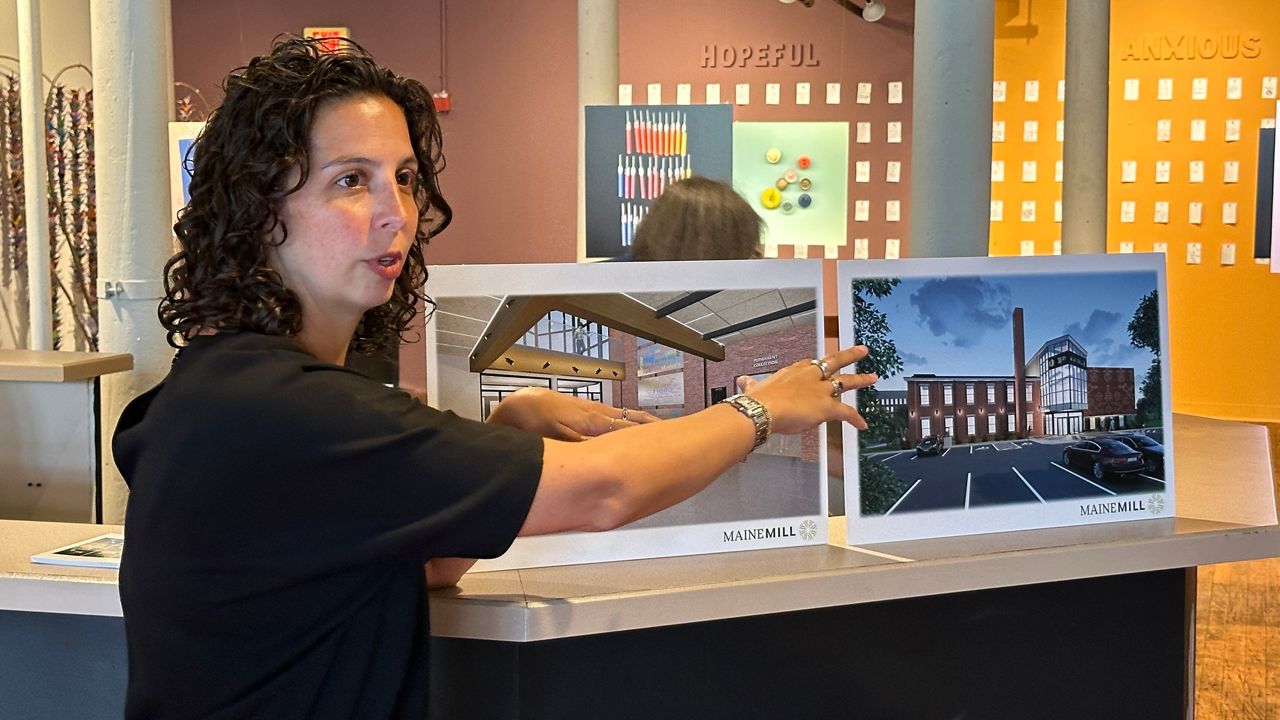The head of the National Endowment for the Humanities toured the Maine Museum of Innovation, Learning and Labor in Lewiston Thursday as part of a three-day swing through Maine.
In just two months, the museum is scheduled to break ground on a new space near Simard-Payne Memorial Park, thanks in part to a $500,000 humanities grant awarded in 2022 to help fund the $13.5 million project.
The museum has outgrown its current space, which is spread out over multiple floors in one of the old Bates mills. The museum celebrates those who worked in the mills and factories that made shoes, blankets, bricks and more from the 1850s to the 1990s.
It’s also become the city’s repository for artifacts that honor those killed last October in shootings that took the lives of 18 people at a bowling alley and a bar.
Rachel Ferrante, executive director of the museum, said they are renovating an existing mill on the Lewiston riverfront and will build an addition. If all goes well, they will open in the new space in 2026.
“We are really aiming to be a cultural hub of this community, be a destination point not just for the local community but also for people visiting central Maine and points beyond,” she said. “And be accessible and inclusive to all the various communities that exist here in Lewiston and Auburn and all of Maine.”
During the Thursday tour, Ferrante talked about the 300 oral histories the museum has gathered from textile, brick and shoe workers and ongoing efforts to interview Black workers and those impacted by the mass shooting.
Current displays show a poster recruiting 120 girls and boys to work in the mill to make tent cloth for Civil War soldiers. The poster indicated the workers, putting in nine-hour shifts, would be “twisting, spooling, spinning, doffing and quilling.”
Other displays focused on union labor, unpaid labor and women’s domestic labor.
Upstairs, there’s a Jacquard loom, spools of thread and an early silk screen. The collection includes more than 10,000 artifacts.
After the tour, Lowe said making sure people can see the early technology will help them understand the process and the history of the area.
“We understand that we know who we are as a country, as a people based on our history and understanding that history is necessarily kind of seeing the artifacts, seeing the photos,” she said.
On Wednesday, Lowe visited the Abbe Museum in Bar Harbor and the Scarborough High School Civil Rights Club.
Thursday’s schedule included the Sabbathday Lake Shaker Village and Portland Museum of Art. And on Friday, she is scheduled to head to the Chebeague Island Historical Society.
U.S. Rep. Chellie Pingree (D-1st District) is a ranking member of a congressional committee that oversees the humanities endowment and the National Endowment for the Arts.
Pingree, who is also co-chair of the Congressional Arts Caucus, said the museum is capturing the history of the city.
“It tells the story of our grandparents, of our communities, how did we turn into the communities we are today,” she said. “How did America evolve? Whether it’s how we evolved with labor or technology, what’s our positive and negative history. This is one of those places that does an amazing job about a city that not everybody in Maine knows a lot about.”
Last year, Pingree led a subcommittee that dedicated the highest-ever level of funding for arts and humanities, which included $207 million each for the NEA and NEH, according to her office.
Just last week, three projects in Maine received nearly $456,000 as part of a national effort to dole out $37.5 million in grants for 240 humanities projects.
The Maine State Library in Augusta got $261,595 for a project to digitize 100,000 pages of historic Maine newspapers that focus on “environmental themes, labor, local industries and French-language newspapers.”
In Hinckley, the Good Will Home Association received nearly $7,000 for a project to purchase furniture and train staff for collections “documenting the history of childcare and the regional history of Maine.”
And in Waterville, Colby College received just over $187,000 for a project to study incarceration in Maine and Massachusetts.
Ferrante said in Lewiston, the federal funds helped get the ball rolling for their new project.
“The NEH grant was a very early catalyst in making our success possible,” she said.



